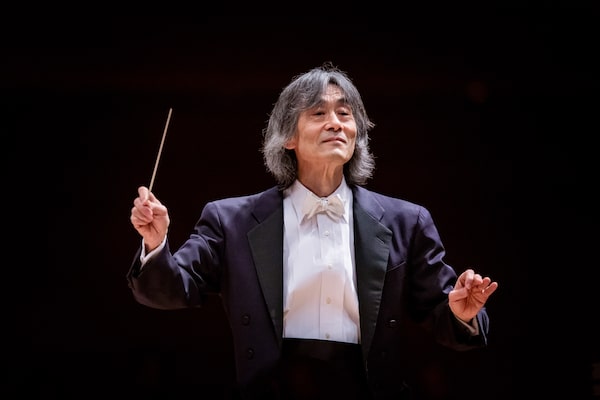
Maestro Kent Nagano told the Globe and Mail that the program came together late because physical-distancing considerations affected its logistics.Antoine Saito
When Kent Nagano takes the podium to lead the Montreal Symphony Orchestra in a program of Mahler and Debussy at the Festival de Lanaudière in Joliette, Que., it not only marks the resumption of the summertime classical music fixture after last year’s cancellation because of COVID-19, but also the return of the maestro who led the orchestra as its music director from 2006 to 2020.
The concert takes place at the Amphithéâtre Fernand-Lindsay, where 831 people will be allowed to attend in a venue with a capacity of 7,000. According to Nagano, who spoke to The Globe and Mail on Zoom from Montreal, the program came together late because physical-distancing considerations affected the logistics of the presentation.
Following rules is a bit of a deviation for the 69-year-old, whose long, distinguished career has been marked by experimentation. This is a man who collaborated with Frank Zappa in 1982, when he conducted the London Symphony Orchestra in a presentation of the iconoclastic rock musician’s lesser known orchestral compositions. “My admiration for him lasts to this day,” says Nagano, music director of the Hamburg State Opera and OSM conductor emeritus. “He’s a strong reminder against trying to pigeonhole or categorize things, which goes against the greatness of artistic creation.”
Nagano’s appearance at Lanaudière will be his first in front of a live audience since February, 2020.
Your appearance at the Festival de Lanaudière was a late addition to the lineup. How did it come together?
Throughout the world, it’s been very difficult to make any sort of long-term planning. I kept these dates free for the Orchestre symphonique de Montréal, but no one was expecting that we would be allowed to play. Two and a half weeks ago the outlook became positive enough that we allowed ourselves to be optimistic and to put together the program.
That’s pretty short notice. We don’t usually think of the OSM as a pick-up band.
Yes, from that sense, it was very unusual. Usually with large and great traditions of classical music, we tend to plan months, even years in advance. But that’s not always the way music is supposed to be. There should be left a space for spontaneity, and to respond to what the particular situation is. Hopefully the audience will enjoy the program we came up with.
Were there any limitations placed on the performance, in accordance with provincial health and safety regulations?
It is still deemed too dangerous to have a chorus because of the danger of aerosol being contagious to other people around. We need to respect social distancing as well. The string players, for example, cannot sit together and share a stand. The last movement in Mahler’s Symphony No. 4 does have a soprano soloist. Of course, she will have to sing from a distance, so that there is no danger through her breathing or her pronunciation of the text that somehow inadvertently would be contagious to her colleagues.
Did the regulations affect the choice of Symphony No. 4 and Debussy’s Prélude à l’après-midi d’un faune?
We didn’t approach it that way. We approached it with the questions, what would be the right thing to bring to Joliette? What would be the right way to reopen the Festival de Lanaudière? How should we properly and appropriately stimulate the public after we’ve been forbidden to play live for so long? What’s the right way to celebrate the fact that we can now come together as a community? Those two pieces, at least for us, neatly fulfilled those questions in a perfect way.
I imagine the program choices were affected by the summer festival setting in Joliette, yes?
Prélude à l’après-midi d’un faune is set for musical poetry. It describes those magic parts of the countryside. Not only the nature, but also the magic that can take place in a countryside image that probably we wouldn’t experience in the middle of a big metropolis. Basically it takes place on a hot summer afternoon in the countryside. As for the Mahler, beautiful folk songs and folk-dancing images take place in No. 4. This takes place in the villages. So, we felt this combination was the best way to celebrate regional culture, in Joliette, and the return of live music.
I’m sure you’re too humble to admit it, but can we see your return to Quebec as a symbol of a return to normalcy?
You’re the first person to suggest that I’m normal [laughs]. Most people go out of their way to describe me as someone who is not normal. But, I must say, the return this week to Montreal, it felt like I had come home to family. Somehow the Quebec culture makes sense in a way that no place in the world does. It’s been so rich and rewarding to come back. So, maybe, in a funny way, that is a kind of normal.
Kent Nagano conducts the Montreal Symphony Orchestra on July 16 at the Festival de Lanaudière in Joliette, Que.
This interview has been condensed and edited.
Sign up for The Globe’s arts and lifestyle newsletters for more news, columns and advice in your inbox.
 Brad Wheeler
Brad Wheeler